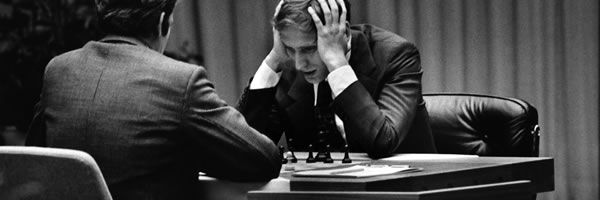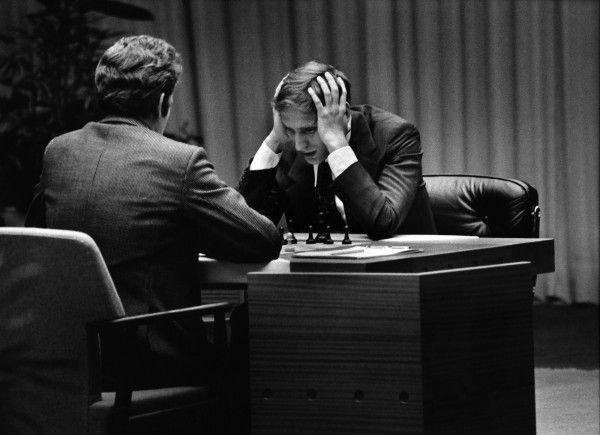It would be nice if people we admired for their talent were also admirable for their demeanor. Unfortunately, this is not always the case. Bobby Fischer is celebrated as one of the greatest chess players who ever lived if not the greatest. He was also “complicated”, “enigmatic”, and “private” which are all super-nice ways of saying he was a raging ass-hole. And the arc of his life wasn’t one of redemption or even tragedy. He was simply an ass-hole who was really good at chess who became a super-crazy ass-hole who was irrelevant in the world of chess. Liz Garbus’ Bobby Fischer Against the World provides a solid overview of the chess prodigy’s life, but it doesn’t bring any new information to the table or offer any strong insights into the nature of greatness and madness.
Fischer mostly follows the chronology of its subject’s life with the centerpiece being Fischer’s famous match against Boris Spassky for the world championship in 1972. It’s bizarre to think how much chess captured the national imagination and at its center was a kid from Brooklyn who essentially taught himself to play. However, even from a young age, Fischer was astoundingly arrogant. His parents didn’t play a strong role in his life and he devoted himself entirely to chess. Garbus makes a weak argument that the nature of chess somehow rewired Fischer’s brain and drove him to madness. I think the real culprit is that he was a young kid with no one protecting him and he was devoured by fame. If you grow up believing you’re the greatest and you have the chess victories to prove it, then you’re likely to think that every thought that enters your crazy mind is the absolute truth.
However, Fischer’s chess skill is undeniable because everyone attests to it. While Garbus does a good job of examining how the Fischer-Spassky games were played, she never explains what exactly set Fischer apart in terms of technical mastery. Yes, he devoted his life to chess, but what was his style of play? Did he play offensively or defensively? Did he slow-play his opponents or go for speed? Even presuming he could do it all, did he have preferences? A visual representation of Fischer’s skill would have helped to provide a better understanding of his chess acumen even though his talent is generally accepted as fact.
But while Fischer may have been a grand master, he was a wretched sportsman. Again, we want the people we admire to be heroes and usually they fall short. But Fischer didn’t even bother to show up. I don’t mind that he had a request for privacy if his real love was for chess. But his behavior towards and during the world championship was despicable. He showed no respect for the game, for his opponent, or for the organization hosting the tournament. It was all about him and yet he was nothing without chess. Greatness at chess requires brilliance, but Fischer was remarkably foolish in his behavior.
Going into the film, I already knew that Fischer was a chess prodigy and was an anti-Semitic jackwad who laughed at the U.S. on 9/11. I went in hoping to gleam some insight into what made him a chess genius and one of the world’s most punchable human beings. Bobby Fischer Against the World doesn’t really offer either. It’s a well-constructed documentary that eloquently provides an overview of an infamous public figure. But for those looking for a new angle on Fischer or a broader overview on his demented nature won’t find Bobby Fischer Against the World to be much of a game changer.
Rating: C
For all of our coverage of the 2011 Sundance Film Festival, click here.


